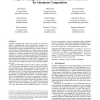Free Online Productivity Tools
i2Speak
i2Symbol
i2OCR
iTex2Img
iWeb2Print
iWeb2Shot
i2Type
iPdf2Split
iPdf2Merge
i2Bopomofo
i2Arabic
i2Style
i2Image
i2PDF
iLatex2Rtf
Sci2ools
119
Voted
ASPLOS
2015
ACM
2015
ACM
Compiler Management of Communication and Parallelism for Quantum Computation
Quantum computing (QC) offers huge promise to accelerate a range of computationally intensive benchmarks. Quantum computing is limited, however, by the challenges of decoherence: i.e., a quantum state can only be maintained for short windows of time before it decoheres. While quantum error correction codes can protect against decoherence, fast execution time is the best defense against decoherence, so efficient architectures and effective scheduling algorithms are necessary. This paper proposes the Multi-SIMD QC architecture and then proposes and evaluates effective schedulers to map benchmark descriptions onto Multi-SIMD architectures. The Multi-SIMD model consists of a small number of SIMD regions, each of which may support operations on up to thousands of qubits per cycle. Efficient Multi-SIMD operation requires efficient scheduling. This work develops schedulers to reduce communication requirements of qubits between operating regions, while also improving parallelism.We find t...
Related Content
| Added | 16 Apr 2016 |
| Updated | 16 Apr 2016 |
| Type | Journal |
| Year | 2015 |
| Where | ASPLOS |
| Authors | Jeff Heckey, Shruti Patil, Ali JavadiAbhari, Adam Holmes, Daniel Kudrow, Kenneth R. Brown, Diana Franklin, Frederic T. Chong, Margaret Martonosi |
Comments (0)

